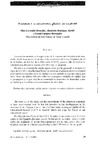Identificador persistente para citar o vincular este elemento:
https://accedacris.ulpgc.es/jspui/handle/10553/5480
| Campo DC | Valor | idioma |
|---|---|---|
| dc.contributor.author | Escandell, M. O. | en_US |
| dc.contributor.author | Rodríguez Martín, Alejandro | en_US |
| dc.contributor.author | Cardona Hernández, Goretti | en_US |
| dc.date.accessioned | 2011-05-24T02:31:00Z | - |
| dc.date.accessioned | 2018-03-07T09:09:36Z | - |
| dc.date.available | 2011-05-24T04:00:52Z | - |
| dc.date.available | 2018-03-07T09:09:36Z | - |
| dc.date.issued | 2004 | en_US |
| dc.identifier.issn | 0213-0610 | en_US |
| dc.identifier.other | Dialnet | - |
| dc.identifier.uri | https://accedacris.ulpgc.es/handle/10553/5480 | - |
| dc.description.abstract | La atención mediática y la expectativa de la comunidad educativa están centradas, desde hace meses, en el desarrollo normativo de la Ley Orgánica, de 23 de diciembre, de Calidad de la Educación (LOCE), pues de ello dependerá la configuración del nuevo sistema educativo que se propone. De todos es conocida la amplia repercusión que ha generado la entrada en vigor de la LOCE cuya finalidad básica es reformar el sistema educativo español para situarlo en mayores cotas de calidad. En este artículo nos proponemos, por tanto, hacer un análisis reflexivo sobre los principios y medidas de calidad que se propugnan y en qué medida se contempla la atención a la diversidad como un factor que contribuye a la consecución de tales fines. | en_US |
| dc.description.abstract | The attention of the media and the expectations of the education community have been focused over the last few months on the developments in the structure of the Organic Law of the 23rd December relating to Quality of the Educational Product (LOCE in Spanish) which will shape the future of our educational system We all know the effects of the LOCE designed to guarantee future levels of quality in the Spanish education system. In this article, we reflect upon the principles and standards of quality being proposed and to what extent they contemplate diversity as a factor contributing to the fulfilment of the set goals. | en_US |
| dc.format | application/pdf | - |
| dc.language | spa | en_US |
| dc.relation.ispartof | El Guiniguada | en_US |
| dc.source | El Guiniguada[ISSN 0213-0610] (13), p. 29-42 | en_US |
| dc.subject | 58 Pedagogía | en_US |
| dc.subject.other | Diversidad | en_US |
| dc.subject.other | Calidad | en_US |
| dc.subject.other | Sistema educativo | en_US |
| dc.title | Atender a la diversidad. ¿Señal de calidad? | en_US |
| dc.type | info:eu-repo/semantics/article | en_US |
| dc.type | Article | en_US |
| dc.identifier.url | http://dialnet.unirioja.es/servlet/articulo?codigo=1184625 | - |
| dc.compliance.driver | 1 | - |
| dc.identifier.absysnet | 235347 | - |
| dc.identifier.crisid | 1165;-;- | - |
| dc.description.lastpage | 42 | - |
| dc.identifier.issue | 13 | - |
| dc.description.firstpage | 29 | - |
| dc.investigacion | Artes y Humanidades | en_US |
| dc.rights.accessrights | info:eu-repo/semantics/openAccess | - |
| dc.type2 | Artículo | en_US |
| dc.identifier.external | 1165;-;- | - |
| dc.contributor.authordialnetid | No ID | - |
| dc.contributor.authordialnetid | 751247 | - |
| dc.contributor.authordialnetid | No ID | - |
| dc.identifier.dialnet | 1184625ARTREV | - |
| dc.identifier.ulpgc | Sí | es |
| dc.description.sellofecyt | Sello FECYT | |
| dc.description.esci | ESCI | |
| dc.description.erihplus | ERIH PLUS | |
| item.grantfulltext | open | - |
| item.fulltext | Con texto completo | - |
| crisitem.author.dept | GIR Sociedad Digital | - |
| crisitem.author.dept | Departamento de Psicología, Sociología y Trabajo Social | - |
| crisitem.author.orcid | 0000-0002-5228-5533 | - |
| crisitem.author.parentorg | Departamento de Psicología, Sociología y Trabajo Social | - |
| crisitem.author.fullName | Escandell Bermúdez, María Olga | - |
| Colección: | Guiniguada. 2ª Etapa. n.13, 2004 Artículos | |
Visitas
48
actualizado el 10-ene-2026
Descargas
93
actualizado el 10-ene-2026
Google ScholarTM
Verifica
Comparte
Exporta metadatos
Los elementos en ULPGC accedaCRIS están protegidos por derechos de autor con todos los derechos reservados, a menos que se indique lo contrario.
